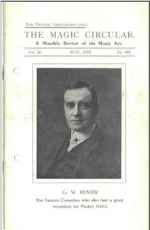Help us get to over 8,755 articles in 2024.
If you know of a magician not listed in MagicPedia, start a New Biography for them. Contact us at magicpediahelp@gmail.com
G. W. Hunter: Difference between revisions
No edit summary |
mNo edit summary |
||
| (6 intermediate revisions by 2 users not shown) | |||
| Line 1: | Line 1: | ||
{{Infobox person | {{Infobox person | ||
| image = | | image = GWHunter.jpg | ||
| image_size = | | image_size = | ||
| alt = | | alt = | ||
| Line 11: | Line 10: | ||
| death_day = May 17, | | death_day = May 17, | ||
| death_year = 1936 | | death_year = 1936 | ||
| death_place = | | death_place = London, England | ||
| resting_place = | | resting_place = | ||
| resting_place_coordinates = | | resting_place_coordinates = | ||
| Line 22: | Line 21: | ||
| misc = | | misc = | ||
}} | }} | ||
'''G. W. Hunter''' (b.1850-d.1936), born George Walter Hunter, was a British comedian/singer also noted for his close-up magic and inventions. He was known the "Father of Pocket Tricks". | |||
== Biography == | |||
Hunter came to the United States when he was 21, moving back to England in 1880. | |||
Hunter's wife, [[Aimee Desiree]] (also known as Mystia) was a professional conjurer in the 1890s. | Hunter's wife, [[Aimee Desiree]] (also known as Mystia) was a professional conjurer in the 1890s. | ||
He created the Hunter Knot, [[Acrobatic Matchbox]], Dual Control gimmick, the Red Snapper, [[G.W. Hunter False Shuffle]] and | He created the Hunter Knot, [[Acrobatic Matchbox]], Dual Control gimmick, the [[Red Snapper]], [[G.W. Hunter False Shuffle]] and [[G. W. Hunter's Cigar Production]]. | ||
A talented magician, [[Max Holden]] said that he was one of the first magicians to master [[The Expert at the Card Table]]<ref>[[The Linking Ring]] (Jan 1933) v12 issue11 p924</ref>. | |||
Hunter contributed to most of the magic magazine of his time and [[Will Goldston]] published many of Hunter's ideas in his books. | Hunter contributed to most of the magic magazine of his time and [[Will Goldston]] published many of Hunter's ideas in his books. | ||
| Line 31: | Line 36: | ||
== Books == | == Books == | ||
"Mystia" or "The World or Magic", which was written in the 1890s, is to be included in "The Davenport Story" Volume Two, The Lost Legends (2010). | "Mystia" or "The World or Magic", which was written in the 1890s, is to be included in "The Davenport Story" Volume Two, The Lost Legends (2010). | ||
{{References}} | |||
[[Category:Biographies]] | [[Category:Biographies]] | ||
{{DEFAULTSORT:Hunter}} | {{DEFAULTSORT:Hunter,G}} | ||
Latest revision as of 06:31, 17 May 2024
| G. W. Hunter | |
 | |
| Born | George Walter Hunter May 16, 1850 England |
|---|---|
| Died | May 17, 1936 (age 86) London, England |
G. W. Hunter (b.1850-d.1936), born George Walter Hunter, was a British comedian/singer also noted for his close-up magic and inventions. He was known the "Father of Pocket Tricks".
Biography
Hunter came to the United States when he was 21, moving back to England in 1880.
Hunter's wife, Aimee Desiree (also known as Mystia) was a professional conjurer in the 1890s.
He created the Hunter Knot, Acrobatic Matchbox, Dual Control gimmick, the Red Snapper, G.W. Hunter False Shuffle and G. W. Hunter's Cigar Production.
A talented magician, Max Holden said that he was one of the first magicians to master The Expert at the Card Table[1].
Hunter contributed to most of the magic magazine of his time and Will Goldston published many of Hunter's ideas in his books.
Books
"Mystia" or "The World or Magic", which was written in the 1890s, is to be included in "The Davenport Story" Volume Two, The Lost Legends (2010).
References
- ↑ The Linking Ring (Jan 1933) v12 issue11 p924